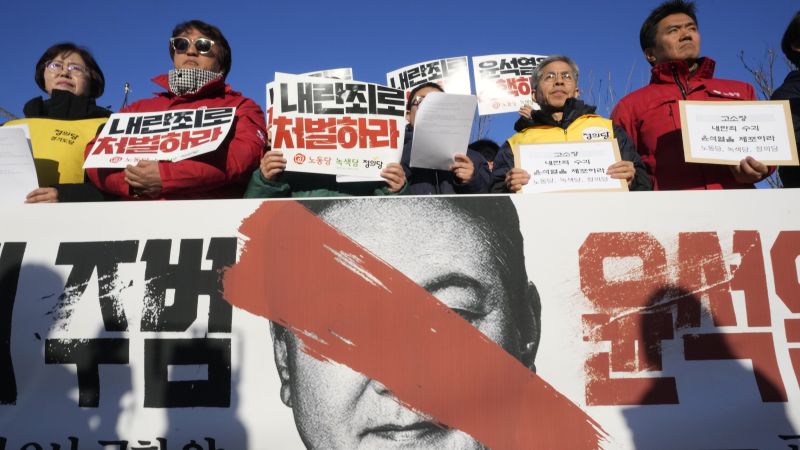On Tuesday night, South Korea’s President Yoon Suk Yeol stunned the nation by declaring martial law for the first time in nearly 50 years, citing threats from “anti-state forces” and North Korea. His late-night announcement involved the military taking control, with troops and police deployed to the National Assembly, and restrictions imposed on political activities and media.
However, it soon became evident that Yoon’s decision was not driven by external threats but by mounting political pressure and internal challenges. The move sparked immediate protests from opposition lawmakers and citizens, who rallied at parliament to block the decree.
Thousands of protesters gathered outside the National Assembly in response to Yoon’s martial law declaration. Opposition leaders, including Lee Jae-myung of the Democratic Party, mobilized their supporters, urging them to defy the restrictions and show up in protest.
Despite the military presence and heightened security, protesters chanted slogans like “No martial law” and “strike down dictatorship,” while some clashes with police occurred at the gates.
Politicians also defied the measures, with many lawmakers making their way to the voting chamber to reverse the decision. Shortly after 1 a.m. on Wednesday, South Korea’s parliament voted to invalidate the martial law, rendering Yoon’s decree null and void.
Martial law, a temporary measure that grants military authorities exceptional powers during emergencies, has not been invoked in South Korea since 1979. Yoon’s declaration marked a significant escalation, as he described political opposition figures as sympathetic to North Korea, though he did not provide evidence.
Under martial law, civil liberties are suspended, and the military can take control of government functions. Despite Yoon’s move to restrict media coverage and political activity, outlets like Yonhap continued to operate as usual, and protesters continued to challenge the government’s actions.
Yoon’s decision to declare martial law was seen as an attempt to regain control amid a series of political setbacks. Since taking office in May 2022, the president has faced a steep decline in approval ratings, hovering around 17%.

South Korea’s President Declares Martial Law Amid Political Crisis, Sparking Protests and Impeachment Push
His government has struggled with a lack of legislative success, especially after the opposition’s landslide victory in April’s general election. Additionally, several corruption scandals, including allegations involving the First Lady, have tainted his presidency. These challenges, combined with a failed budget proposal, appear to have led Yoon to take drastic action in an attempt to maintain power.
The opposition, led by the Democratic Party, quickly moved to impeach Yoon in response to his martial law declaration. Parliament is set to vote on this motion by Saturday. Impeachment in South Korea requires a two-thirds majority, meaning at least 200 votes in the 300-member National Assembly.
If the impeachment is successful, a trial will be held in the Constitutional Court. A majority vote by the court could result in Yoon’s removal from office, echoing past impeachments, such as those of Presidents Park Geun-hye in 2016 and Roh Moo-hyun in 2004, although the latter was later reinstated.
This dramatic turn of events has shocked the South Korean public, a nation that prides itself on its democratic values. Yoon’s martial law declaration is seen by many as an unprecedented threat to South Korea’s democratic institutions. Experts have criticized the move as an overreach of presidential power and a significant miscalculation.
Leif-Eric Easley of Ewha University argued that the declaration was a desperate attempt to navigate the president’s political crisis, which has now only deepened. He warned that the incident could harm South Korea’s international reputation more than even the U.S. Capitol riots of January 6, 2021.
President Yoon Suk Yeol’s sudden declaration of martial law has provoked widespread protests and legal challenges, including an impending vote on his impeachment. His drastic action, driven by political turmoil and corruption scandals, has shaken the nation’s democratic foundations. The unfolding crisis is a pivotal moment in South Korea’s political history, with consequences that could reverberate far beyond the current administration.
